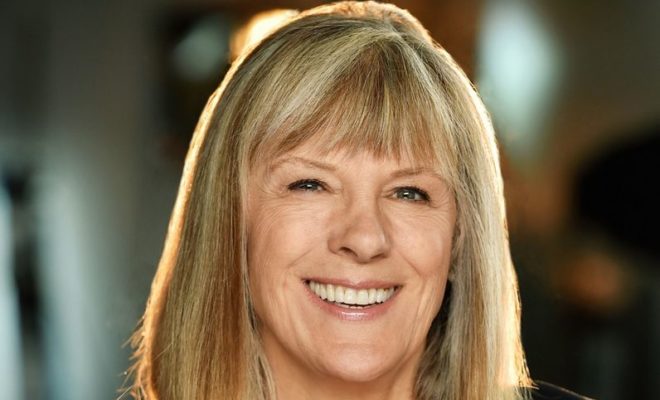
Interviews
Mimi Kennedy – Mom
By: Kelly Kearney
Q) What made you want to sign on to this role? Was there something about Marjorie that just jumped off the page and made you want to step into her shoes?
A) It’s amazing how many times I get questions about choices I make to take roles. So, often it’s just, “Somebody asked me!” Same with Marjorie; someone (casting directors at Warners who’ve known me much of my career (Chuck Lorre or Eddie Gordestsky who knew me from “Dharma & Greg”) thought I’d be great at this role and offered it to me. I showed up at the table read, and voiced her and embodied her. I totally recognized the type of comedy Marjorie was asked to fulfill as written and we were off to the races. I struggled a little understanding what had formed her – upbringing, education, what led to her rock bottom? I know only she’d gone wild as a flower child/radical (which I knew something about from my own youth) but had lost herself in addictions, which I had not. The gradual collaboration of wardrobe, writing and my memory/imagination brought about Marjorie. I also learned about working the 12 Steps with a sponsor – life-changing information.
Q) Without spoiling anything, what can we expect from Marjorie in Season 7?
A) What is hard for widowed women in their seventies? What is hard for women in an unforgiving economy when they are at an age where people don’t think of paying them to do anything? What makes life bearable? Good old 12 Steps are a guide and friends are a support.
Q) With Victor gone and Marjorie spending a lot of time with her cats, is it time for her to hit the dating scene and find romance? Perhaps Ned, Christy’s Gambler’s Anonymous sponsor?
A) Hah! I’ve thought the exact same thing! Those secrets are kept close in the Writers’ Room and I’m usually clueless until I see the next week’s script on Friday night after taping the current week’s show for our live audience!
Q) If you could write a Marjorie centered episode, what would the main focus be?
A) She has an estranged adult son. Maybe there will never be a working connection. But the wound is in her own soul. How does sobriety help her deal with that? I’d find it interesting to have an answer, “Mom” style, television-style – humor at hard stuff but also balm for the heart. It doesn’t have to end in a hug. Parents and children are connected forever, for better or for worse. I know estranged situations where the sober person has to keep strict separation when the grown child exploits the parent without taking any steps necessary to get out of bad situations. I know other situations where occasional touching moments happen, but they don’t result in happily ever after. Marjorie getting a text from her son that he wanted to see her, after Christy (Anna Faris) visited and told him of Marjorie’s cancer, was one such moment. She was moved. The writers left it up to audience (and our) imagination what had happened after that. In that episode the son is so bitter he tells Christy, “I’m rooting for the cancer.” In an episode last season where Christy faces her own estranged relationship with daughter Violet (Sadie Calvano), Marjorie admitted she had “no relationship with my son” and could only “focus on my own sobriety” as the thing she can control. Harms of the past are often the things you can’t change and 12-steppers pray for serenity to “accept” those while changing, courageously, the things they can and developing “the wisdom to know the difference.”
Q) There are not a whole lot of television shows with a majority female cast telling female driven stories. Talk about working alongside Allison Janney and Anna Faris.
A) They are both brilliant, at different stages of their acting careers. (Allison has won the Academy Award that represents the acknowledged ultimate peak. Yet acting never stops with such achievements when people love it the way true actors do. We just keep on, hit or miss.)
The gift of “Mom” to the world is that, for as many years as it persists, it showcases these two side by side in that brilliance with great writing as the wind beneath their wings. Anna is serious – a Seattle girl, smart as a whip. She’s already produced her own projects. She used her blond Barbie look to satirize gender norms in House Bunny like a Millennial Jane Austen. Allison is Midwest – Ohio (culturally similar to where I grew up in western New York State). Also brilliant; went to Kenyon College. And a competitive ice skater as a teenager! Both of them love to play. They know how to be hysterically funny. I couldn’t ask for better cast mates – or better team leaders, which series stars have to be or the wheels fall off fast.
Q) Over the course of your career, you’ve worked alongside some amazing talent. Who would be your dream guest star to work with on “Mom?”
A) Sitcom is such a specialized thing! I’d say Mark Rylance, but does he do sitcom? Would he like it? Would he play himself as an English-born-in-America-highly-awarded actor? Again, this is one for the Writers’ Room! Also, I’d say Bob Dylan but he actually PLAYED HIMSELF in a musical-segment tag on “Dharma & Greg.” So, I got to meet him, though I wasn’t part of that one-scene story – a “tag” to the episode. Jenna Elfman was (and she made Bob laugh). So, that dream was fulfilled. Majorly. Lily Tomlin and Jane Fonda as the characters they play in their show, “Grace and Frankie,” or themselves would be amazing. I loved having Rosie O’Donnell.
Q) What have you personally taken away from your time portraying Marjorie?
A) Knowledge and practice of the 12 Steps of recovery. Again, life-changing. Also, more self-respect as an actress than I’ve felt before doing sitcoms. And a lot less fear of aging.
Q) Besides acting, you’ve had a long career in progressive political activism. Are you excited to see so many progressives getting elected in the last few years? What are you most looking forward to in the upcoming election year?
A) I am beyond thrilled that the progressive movement finally reached the threshold where it’s seen for the powerful force it is. When we were organizing at the grassroots, I could see its power, but we were beneath the radar. The press resisted the word “progressive.” “What’s wrong with liberal?” Even my friends would ask. The press would talk about liberal vs conservatives and completely miss that there was this new thing coming along that transcended old right-left categories. Progressives wanted to stop huge expensive killing plans (perpetual war) and devote resources and jobs to taking care of one another (healthcare) and cleaning up the environment. We wanted to respect working families (fund education and working families’ economic aspirations). The climate crisis, running out of water, of food, is terrifying— helped the whole thing grow to the point where it got over.
I’m looking forward to the next generation leading solutions and helping us change our ways.
Q) Hollywood is notorious for its ageism when it comes to actresses. Do you feel like we are finally starting to see doors open for mature actresses now that there are so many platforms producing character driven stories?
A) Yes, absolutely. Our generation – the demographic bulge of babies born to parents recovering from the fear and separations of World War II in the US – is now aging. Now we’re recognizing the virtues of our own longevity, just as we (perhaps too much) touted the righteousness and vigor of our wild youth. We have been criticized for being too self-centered, but the sheer numbers of us caused this: the market and advertising pandered to us. But we felt we had one another, as a national community. This helped us develop, in some ways, a nurturing, supportive culture that could even sometimes cross lines of race and class. Black Power, Civil Rights, the Peace Movement and the Summer of Love and Exploration into Higher Consciousness pushed us forward. There were mistakes, too. But it got undone with global competitiveness and de-construction of US social safety net in favor of helping our corporations claim more global ground. That’s how I see it. In the middle of all this a generation of elders emerges that can say, “I’ve seen a lot” – including the untimely deaths by addiction and inner desperation of many of people we looked to as celebrities. If elderhood means sharing how we deal with survival from the inside out as well as the outside in, let us see that. I think that’s the undercurrent. And it can be funny too. Alan Arkin on our producer Chuck Lorre’s “The Kominsky Method” – that is survival humor wrought by connection, across generations, despite the losses that come with age.
Q) You worked with Chuck Lorre on “Dharma and Greg,” before he offered you the role of Marjorie. What do you continue to enjoy about working with Chuck? Is he as funny on-set as his one line zingers he writes for the show?
A) Chuck is a genius. I don’t know what formed him, but his humor antennae are acutely fine-tuned for truth. He appreciates anything that comes from truth. He likes to let us work without fearing judgment. But, of course, we listen for the laughter that comes from the writers seeing their words leap from the page. When Chuck’s really amused you can hear him sort of cough with laughter; that tells you you’ve really hit home with something true.
Q) Besides the new season of “Mom,’ starting September 26, are you working on any other projects the fans can keep an eye out for?
A) I just did an indie movie called Pencil Town that is based on a real story of a Wall Street hedge fund guy who comes home to his father’s funeral to find the three-generation family business deep in debt and his mother (me) about to lose the house. It’s a pencil factor and it’s the main employer in the small town in Pennsylvania. His Wall Street firm specializes in preying on such situations; they would buy the factory, close it and sell its parts for profit. Instead, the guy and his high-school girlfriend – a family friend who works in the business office – construct a shareholding plan for the workers and the company is saved. He then quits Wall Street and with the girlfriend starts a business that repeats their strategy for struggling US businesses. The writer actually did this; it’s his story.
Q) What would you like to say to everyone who is a fan and supporter of you and the work you do?
A) I am deeply grateful and let’s keep going. I’ll try to deliver stuff what makes you feel better about life and makes you want to live your own no matter what you face. Also, I’ll try to make you laugh out loud. Those aspirations have driven me this far and I’m still on the road— thank you for your good company.





2 Comments
You must be logged in to post a comment Login